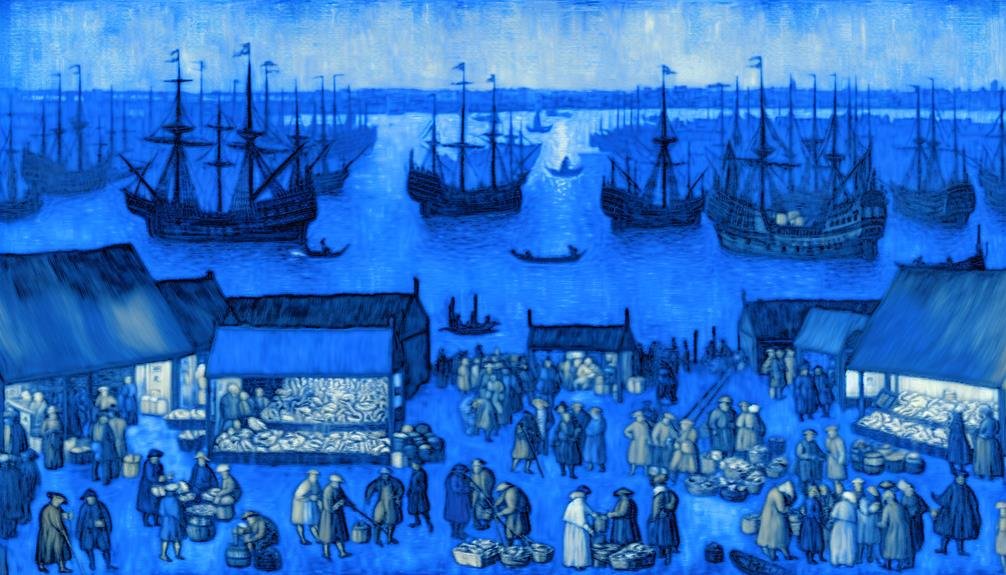In addition, Mercantilism is an economic doctrine focused on accumulating wealth through a favorable trade balance and utilizing colonies for resources. Its advantages include bolstering domestic industries, creating jobs, enhancing economic resilience, and ensuring self-sufficiency and national security. However, it also has drawbacks: it can deplete local raw materials, hinder cultural exchanges, strain international relations, create economic inefficiencies, and promote self-centered trade policies. Additionally, it often results in the exploitation and economic disparities of colonies. To understand the broader implications and contemporary perspectives, it's beneficial to examine its historical and modern impacts further.
Takeaways
- Pros: Prioritizes Domestic Industries: Mercantilism fosters the growth of local industries, boosting economic resilience and job creation.
- Cons: Depletes Local Raw Materials: Intensive exploitation of natural resources can lead to environmental degradation and unsustainable practices.
- Pros: Enhances National Wealth: Encouraging exports over imports creates a favorable trade balance, accumulating wealth and strengthening the economy.
- Cons: Strains International Relations: Protectionist policies and trade restrictions often lead to conflicts and strained relations with other nations.
- Cons: Economic Inefficiency: Mercantilism's focus on self-sufficiency can hinder innovation and efficiency, as it limits competition and collaboration.
Understanding Mercantilism
How did mercantilism shape economic policies and national strategies during its dominance from the 16th to 18th centuries?
Mercantilism, as an economic system of trade, profoundly influenced national policies by prioritizing the accumulation of wealth and power. Central to this economic doctrine was the belief that a nation's wealth was static and finite, necessitating a favorable balance of trade to increase a country's wealth. This was achieved by maximizing exports and discouraging imports, thereby guaranteeing that the value of goods and services exported exceeded those imported.
Countries under mercantilist policies often focused on establishing colonies, which served as sources of raw materials and resources. These colonies provided the mother country with the necessary inputs for manufacturing goods, which were then exported back to the colonies and other markets. This cycle ensured a continuous inflow of wealth and bolstered the national economy.
Additionally, the mercantilist approach often involved using military power to protect and expand these economic interests, safeguarding trade routes and markets. By regulating trade and maintaining a trade surplus, nations sought to consolidate their economic strength and global influence during this period.
Economic Advantages

Under the framework of mercantilism, nations can greatly increase their wealth by ensuring a favorable trade balance and maximizing the utilization of colonial resources.
This economic strategy not only enhances national revenue but also secures a steady influx of raw materials, reducing dependence on foreign imports.
Consequently, the focus on domestic industries and resource exploitation fosters job creation and economic stability.
Increased National Wealth
Mercantilism enhances national wealth by prioritizing exports over imports, thereby achieving a favorable balance of trade. This economic doctrine supports policies that bolster domestic industries, leading to increased national wealth through robust economic growth and financial stability.
By emphasizing the production and export of goods, mercantilist policies guarantee that a nation accumulates valuable resources such as gold and silver, which are crucial for economic prosperity and power in the global arena.
These policies contribute to economic growth by stimulating local industries and creating employment opportunities, which in turn enhances the overall wealth of the nation.
Self-sufficiency is another critical aspect of mercantilism; by reducing reliance on foreign imports, a country strengthens its economic independence and stability. The accumulation of gold and silver through favorable trade balances further augments national wealth, providing the financial resources necessary to support other economic activities and investments.
Ultimately, mercantilist strategies aim to create a thriving and prosperous economy by concentrating on exports and minimizing imports. By doing so, they help to secure sustained economic prosperity and financial stability, reinforcing the nation's position in the international economic landscape.
Trade Balance Favorability
Prioritizing a favorable trade balance, mercantilism strategically enhances a nation's economic advantages by promoting exports while restricting imports. This approach guarantees that more wealth flows into the country than out, accumulating precious metals such as gold and silver, which were historically considered the benchmarks of national wealth and power.
By curtailing imports, mercantilism aims to stimulate domestic industries, creating job opportunities and fostering economic growth within the nation. This focus on internal production reduces dependency on foreign goods, thereby promoting self-sufficiency. Domestic industries are bolstered, ensuring that the country can meet its own needs without excessive reliance on external sources.
To achieve this trade balance favorability, mercantilist policies often include protectionist measures such as tariffs and quotas. Tariffs raise the cost of imports, making domestic products more competitive, while quotas limit the quantity of specific goods that can be imported. These protectionist policies safeguard nascent industries from international competition, allowing them to develop and thrive.
Colonial Resource Utilization
Colonial resource utilization frequently provided mother countries with significant economic advantages by enabling the extraction and exportation of valuable raw materials. Under mercantilism, mother countries exploited the abundant natural resources found in their colonies for substantial economic gain. This system allowed for the extraction of minerals, timber, and agricultural products, which were then exported back to the mother country. Such exploitation bolstered the mother country's revenue streams, fostered job creation, and facilitated industrial growth.
The colonies served as essential suppliers of raw materials, fueling the manufacturing industries within the mother country and contributing markedly to its economic development. This influx of resources accelerated economic activities and supported the expansion of industrial sectors, positioning the mother country as a dominant economic power.
However, this approach was not without its drawbacks. The relentless extraction of natural resources often led to severe environmental degradation and the depletion of valuable assets. Moreover, the colonies became economically dependent on the mother country, as their economies were primarily structured around the extraction and exportation of raw materials. This dependence stifled local economic development and left lasting impacts on the environmental and economic landscapes of the colonies.
Political Benefits
How does a nation enhance its political power and stability in the global arena? Mercantilism offers a pathway to achieving this through the promotion of self-sufficiency and meticulous trade regulation.
By emphasizing self-sufficiency, a mercantilist nation reduces its dependence on foreign sources, thereby fortifying its national security and political power. This approach enables governments to regulate trade effectively, ensuring that domestic industries thrive and contribute notably to the nation's economic strength.
Furthermore, by encouraging exports and discouraging imports, mercantilism helps maintain a favorable balance of trade. This advantageous balance is pivotal for a nation to leverage political influence and maintain economic stability. The creation of robust domestic industries not only boosts economic resilience but also enhances political stability and power.
Additionally, mercantilism can foster cultural exchanges and strengthen international relations through strategic trade partnerships and trade agreements. These collaborations can lead to improved diplomatic ties and mutual benefits, further solidifying a nation's global standing.
To summarize, the political benefits of mercantilism are manifold, offering a strategic advantage regarding national security, economic strength, and international influence, all of which are essential for a nation's enduring political power and stability.
Social Drawbacks

While mercantilism offers significant political benefits, it also presents notable social drawbacks that can undermine its long-term effectiveness. One major issue is the creation of resentment among trading partners. This resentment arises from the mercantilist preference for the mother nation, often leading to tension with other countries. This approach can strain international relations and foster an environment of distrust and hostility.
Furthermore, mercantilism can lead to the depletion of local raw materials and resources. The relentless focus on stockpiling wealth through trade can exhaust these resources, making the system ultimately inefficient in promoting sustainable economic growth.
Mercantilism also hinders cultural exchanges by promoting a self-centered approach to trade. This isolationist stance can limit opportunities for mutual understanding and cooperation between nations, which are essential for global harmony.
The social drawbacks of mercantilism are numerous and impactful:
| Negative Aspect | Emotional Impact | Consequence |
|---|---|---|
| Resentment | Frustration | Strained international relations |
| Preference | Unfairness | Tension with other countries |
| Resource Depletion | Anxiety | Economic inefficiency |
| Cultural Isolation | Alienation | Limited cultural exchanges |
| Self-Centered Trade | Selfishness | Hindered global cooperation |
Colonial Impact

The mercantilist exploitation of colonies for their resources and labor primarily benefited the mother country while stunting the colonies' economic development. The colonial impact of mercantilism was profound, leading to significant economic disparities between the colonies and their European rulers. Colonies faced heavy taxation and limited economic freedoms, as they were often restricted to trading exclusively with the mother country. This monopolistic control not only hindered the growth of local industries but also perpetuated economic dependency on the colonizing power.
The relentless exploitation of resources in the colonies guaranteed a continuous flow of wealth to the mother country, while local economies languished. These economic policies bred widespread discontent among the colonists, who felt increasingly burdened by the unfair treatment and lack of autonomy. This discontent often escalated into resistance, as colonists sought to assert their rights and improve their economic conditions.
The cumulative effects of these mercantilist policies eventually led to conflicts and revolutions. The colonies' struggle against economic oppression contributed to significant historical events, including the American Revolution. Therefore, while mercantilism enriched the mother countries, its colonial impact left a legacy of economic and social upheaval in the colonized regions.
Modern Perspectives

Under modern perspectives, mercantilism's influence on contemporary economic policies and global trade dynamics is critically examined. Proponents argue that prioritizing domestic industries can bolster job creation and economic resilience.
However, critics caution that such protectionist strategies may incite trade conflicts and compromise long-term innovation and efficiency.
Contemporary Economic Policies
Modern economic policies mainly prioritize free trade and globalization, moving away from the mercantilist focus on protectionism and self-sufficiency. Countries are increasingly adopting open-market policies to foster competition and efficiency in the global economy. The drawbacks of mercantilism, such as protectionism and trade conflicts, have prompted a shift towards more collaborative and interconnected economic strategies.
International trade agreements and organizations aim to reduce barriers to trade, promoting fair competition among nations. The digital economy and advancements in technology have also transformed international trade, emphasizing innovation and knowledge-sharing. These modern approaches highlight the importance of connectivity and cooperation, in contrast to the restrictive nature of mercantilist practices.
| Aspect | Mercantilism | Modern Economic Policies |
|---|---|---|
| Trade Philosophy | Protectionism | Free Trade |
| Market Approach | Self-sufficiency | Open-market policies |
| Conflict Nature | Frequent trade conflicts | Reduced barriers via agreements |
| Economic Drivers | Precious metals and resources | Digital economy, technology, innovation |
Global Trade Dynamics
With the global economy increasingly interconnected, current trade dynamics emphasize comparative advantage, specialization, and sustainable practices. Moving away from mercantilist policies, modern global trade is characterized by a shift towards free trade and globalization. Countries leverage their comparative advantages, focusing on specialization to optimize production efficiency and foster interdependent trade relationships.
International trade agreements and organizations such as the World Trade Organization (WTO) play a pivotal role in promoting fair trade practices and reducing trade barriers. These agreements facilitate smoother and more equitable exchanges between nations, ensuring a level playing field.
Technological advancements and digital platforms have revolutionized global trade, enhancing efficiency, connectivity, and accessibility. These innovations allow businesses to engage in international markets with unprecedented ease, driving economic growth.
Moreover, environmental concerns and sustainability goals are increasingly influencing trade policies. Emphasis on responsible and ethical trade practices is growing, with stakeholders prioritizing sustainability in their operations. Ethical trade practices guarantee that economic activities align with environmental and social standards, promoting long-term global well-being.
Frequently Asked Questions
What Are the Cons of Mercantilism?
The cons of mercantilism include economic inefficiency, trade imbalances, resource depletion, wealth disparity, colonial exploitation, domestic monopolies, innovation stifling, market distortions, higher consumer prices, and an over-reliance on export dependency, ultimately hindering long-term economic growth.
What Are the Benefits of Mercantilism?
Mercantilism offers several benefits, including wealth accumulation through trade surplus, resource control, and industrial growth. State intervention and trade barriers foster economic nationalism, while export incentives and market monopolies drive colonial expansion and enhance domestic economic stability.
Why Was Mercantilism Wrong?
Mercantilism was flawed due to colonial exploitation, trade imbalances, and economic nationalism. Resource hoarding, state interventionism, and market monopolies hindered growth, while trade barriers, export emphasis, and import restrictions distorted global trade and wealth accumulation.
What Were the Main Criticisms of Mercantilism?
The main criticisms of mercantilism include colonial exploitation, wealth inequality, economic nationalism, trade restrictions, and ineffective monetary policy. Additionally, price controls, market distortions, capital accumulation, resource hoarding, and merchant monopolies hindered long-term economic development.
Conclusion
Mercantilism, as an economic theory, provided significant advantages for national wealth accumulation and political power. However, it also brought social drawbacks, particularly through increased inequality and exploitation of colonies.
The colonial impact was profound, often resulting in economic dependency and social strife for colonized regions. Modern perspectives on mercantilism recognize its historical importance but critique its sustainability and ethical implications.
A balanced understanding is essential for comprehending its complex legacy in economic history.

